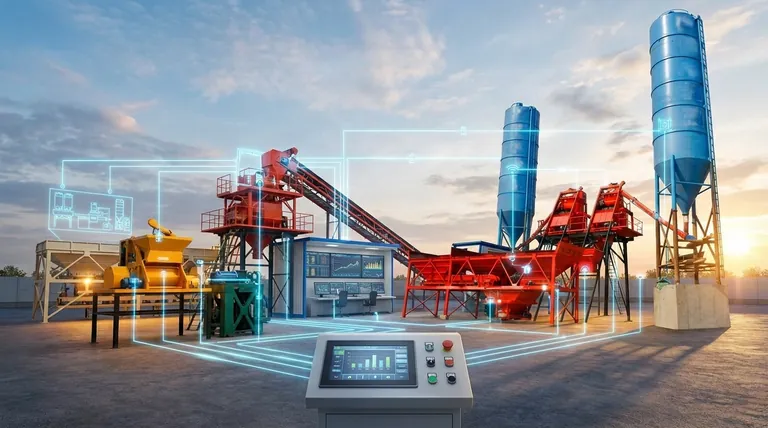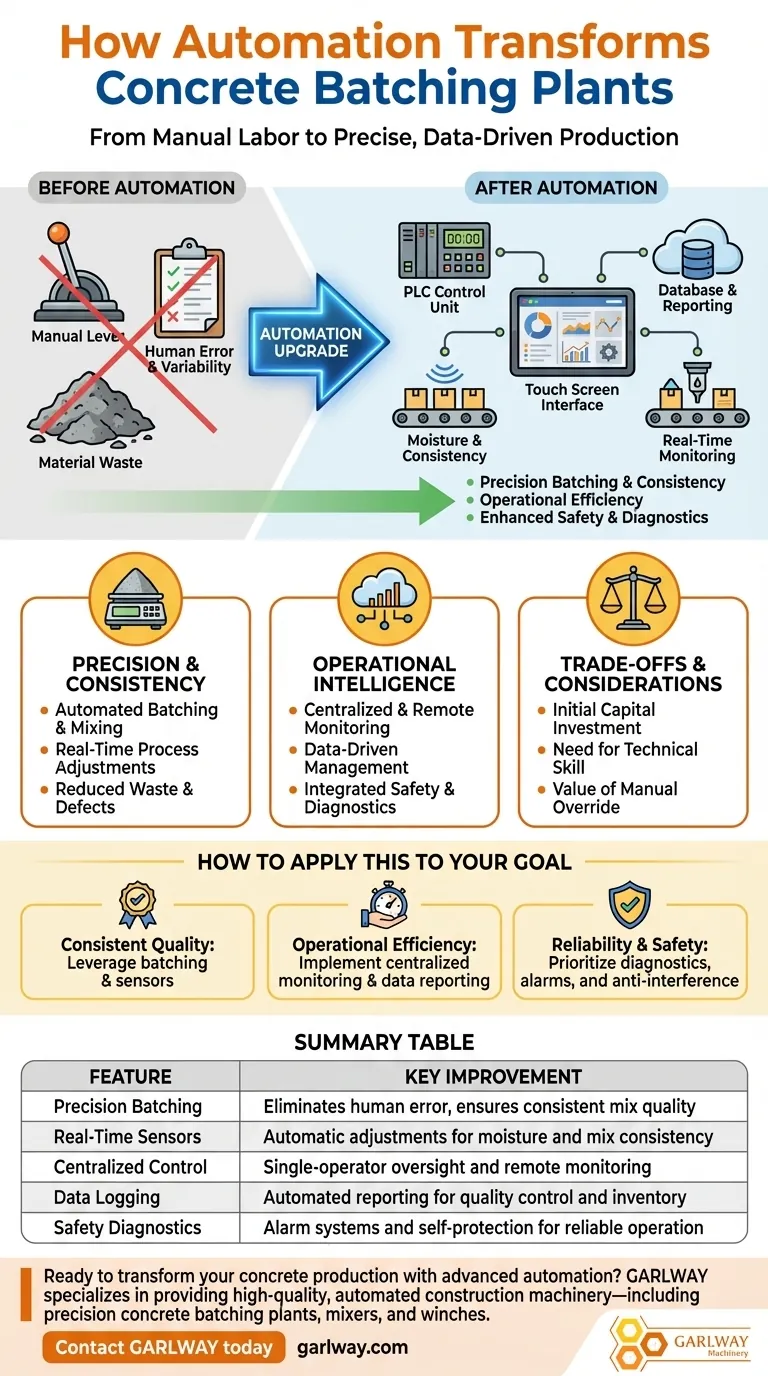In essence, automation has fundamentally transformed concrete batching plants by shifting them from labor-intensive, error-prone operations to highly precise, data-driven production systems. Through the use of computer controls, PLCs, and sensors, automation provides unparalleled control over the entire production cycle—from batching and mixing to monitoring and reporting—resulting in significant gains in quality, efficiency, and safety.
The core improvement is the shift from reactive, manual adjustments to proactive, system-driven control. Automation replaces guesswork with digital precision, ensuring every batch meets exact specifications while providing the data needed for intelligent operational management.

The Foundation of Improvement: Precision and Consistency
The primary value of automation in concrete production is the elimination of human variability. A computer-controlled system executes a programmed formula with a level of accuracy that is impossible to achieve manually, batch after batch.
Automated Batching and Mixing
Modern plants use a Programmable Logic Controller (PLC) or a computer as the core control unit. Operators input the desired mix design, and the system automatically manages the weighing of aggregates, cement, and water, ensuring precise adherence to the recipe. This automated control extends through the entire process, including lifting, mixing times, and discharging.
Real-Time Process Adjustments
Sensors are integrated throughout the plant to monitor variables like moisture content in aggregates and the consistency of the mix. This data is fed back to the control system in real-time, allowing for immediate, automatic adjustments to maintain the target quality and slump without manual intervention.
Reduced Material Waste and Defects
By ensuring every batch is mixed correctly the first time, automation drastically reduces material waste from rejected or out-of-spec batches. This precision minimizes defects and the costly manual checks previously required to catch them.
Enhancing Operational Intelligence and Control
Beyond just making the concrete, automation provides a new layer of oversight and management capability that was previously unavailable.
Centralized and Remote Monitoring
The entire plant can be monitored and controlled from a single computer interface, often a touch screen. This allows a single operator to oversee all operations and provides the capability for remote monitoring, enabling managers to check production status and system health from anywhere.
Data-Driven Production Management
Automated systems log vast amounts of data for every batch produced. This information is invaluable for quality control documentation, inventory management, and performance analysis. Features like automated report printing and demand-based production scheduling allow plants to operate more efficiently and responsively.
Integrated Safety and Diagnostics
Automation builds in a layer of safety and reliability. Systems are designed with alarm self-protection that can detect faults or abnormalities, alert the operator, and in some cases, halt production to prevent damage or accidents. These systems are also built with anti-interference capabilities to ensure stable, reliable operation.
Understanding the Trade-offs and Considerations
While the benefits are significant, adopting automation requires a clear understanding of its implications. It is not a simple upgrade but a strategic shift in how the plant operates.
Initial Capital Investment
The upfront cost of sensors, PLCs, software, and the necessary mechanical integrations can be substantial. This investment must be weighed against the long-term gains in efficiency, material savings, and quality improvement.
Need for Technical Skill
Automated systems require a different skill set to operate and maintain. Staff must be trained to manage the control software, and technicians with expertise in electronics and PLCs are needed for troubleshooting and repairs, replacing the need for purely mechanical expertise.
The Value of Manual Override
Even the most advanced systems benefit from a manual override capability. This essential feature provides a fail-safe, allowing experienced operators to take control during unusual circumstances or system maintenance, ensuring operational flexibility.
How to Apply This to Your Goal
The right approach to automation depends entirely on your primary operational objective.
- If your primary focus is consistent quality: Leverage automated batching and sensor-based moisture controls to guarantee every batch adheres perfectly to design specifications.
- If your primary focus is operational efficiency: Implement centralized monitoring and data reporting to optimize production schedules, manage inventory, and minimize plant idle time.
- If your primary focus is reliability and safety: Prioritize systems with robust fault diagnostics, self-protection alarms, and reliable anti-interference capabilities to ensure maximum uptime.
Ultimately, automation empowers you to produce a more consistent and verifiable product with unparalleled operational control.
Summary Table:
| Automation Feature | Key Improvement |
|---|---|
| Precision Batching | Eliminates human error, ensures consistent mix quality |
| Real-Time Sensors | Automatic adjustments for moisture and mix consistency |
| Centralized Control | Single-operator oversight and remote monitoring |
| Data Logging | Automated reporting for quality control and inventory |
| Safety Diagnostics | Alarm systems and self-protection for reliable operation |
Ready to transform your concrete production with advanced automation?
GARLWAY specializes in providing high-quality, automated construction machinery—including precision concrete batching plants, mixers, and winches—for construction companies and contractors worldwide. Our solutions are designed to deliver the superior quality, operational efficiency, and reliable control detailed in this article.
Contact GARLWAY today to discuss how our automated batching plants can meet your specific project goals and boost your profitability.
Visual Guide

Related Products
- HZS35 Small Cement Concrete Mixing Batch Plant
- HZS120 Ready Mix Concrete Batching Plant Commercial Mud Cement Mixer
- HZS180 Ready Mix Concrete Plant for Foundations with Sand and Cement
- HZS75 Concrete Batching Plant Cement Mixer Price Concrete Mixer Bunnings Mixing Plant
- Portable Concrete Mixer Machine Equipment for Mixing Concrete
People Also Ask
- What are the main systems that make up a large concrete mixing plant? A Guide to the 5 Core Components
- What are the advantages of automation in Concrete Batch Plants? Achieve Superior Quality & Efficiency
- What are the main applications of concrete plants? Powering Ready-Mix, Precast, and Infrastructure Projects
- What role do cement silos play in a batching plant? The Key to Uninterrupted, High-Quality Concrete Production
- What are the methods of material conveyance used in concrete mixing plants? Optimize Your Plant's Logistics
- How do you maintain a batching plant? Ensure maximum uptime and concrete quality with a proactive plan.
- What is the use of an asphalt mixing plant? Build Durable Roads with Precision
- What precautions should be taken with the feeding system in a concrete mixing station? Protect Your Mix Quality & Equipment















